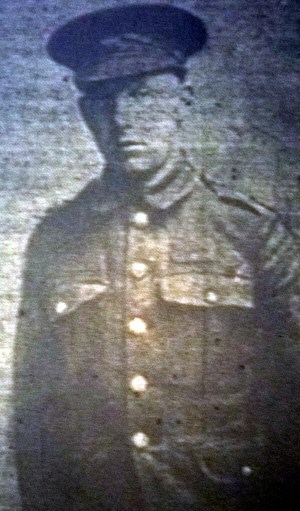Pte
Harry Asquith
Information about birth
|
Date of birth: 01/06/1888 |
|
Place of birth: Ossett, West Yorkshire, England, United Kingdom |
General information
|
Last known residence: Dewsbury, Yorkshire, England, United Kingdom |
|
Profession: Coal miner |
|
Religion: Baptist |
Army information
|
Country: Verenigd Koninkrijk |
|
Force: British Expeditionary Force |
|
Rank: Private |
|
Service number: 33153 |
|
Enlistment place: Ossett, West Yorkshire, England, United Kingdom |
|
Units: — King's Own Yorkshire Light Infantry, 6th Bn. (Last known unit) |
Information about death
|
Date of death: 16/10/1917 |
|
Place of death: Joist Farm, Zonnebeke, Belgium |
|
Cause of death: Killed in action (K.I.A.) |
|
Age: 29 |
Cemetery
|
Tyne Cot Cemetery Plot: LXI Row: G Grave: 16 |
Points of interest 5
| #1 | Place of birth | ||
| #2 | Last known residence | ||
| #3 | Enlistment place | ||
| #4 | Sterfteplaats | ||
| #5 | Place of death (approximate) |
My story
Harry Ashquith was born on 1 June 1888 in Ossett, West Yorkshire, England. He was the son of William Ashquith and Ellen Ashquith. His mother, Ellen Ashquith, died in July 1889 at the age of 43. He worked as a coal miner. He married Annie (Pollard) Asquith on 13 January 1912 in Dewsbury, Yorkshire. Together they had two children: Jack Ashquith (born 1913) and Mary Ashquith (born 1915). His wife, Annie Ashquith, died in March 1915 at the age of 23, two years before her husband Harry Ashquith died as a young father. During the First World War he served in the 6th Battalion King’s Own Yorkshire Light Infantry Regiment (43rd Brigade, 14th (Light) Division).
Near Polderhoek Château the 6th Battalion was heavily shelled by the Germans. Due to German shell fire and the poor condition of the ground, the battalion was forced to withdraw. That day the battalion suffered about 50 casualties, most of which were caused by shell fire. During the night of 15–16 October 1917, the battalion was relieved by the 10th Battalion Durham Light Infantry Regiment. The battalion was sent to Dickebusch and Ridge Wood, where it was present at around 3 am on 16 October 1917. Harry may have died during the relief. Harry's body was found near Joist Farm, Zonnebeke. He was reburied in Tyne Cot Cemetery (plot LXI, row G, grave 16).
Near Polderhoek Château the 6th Battalion was heavily shelled by the Germans. Due to German shell fire and the poor condition of the ground, the battalion was forced to withdraw. That day the battalion suffered about 50 casualties, most of which were caused by shell fire. During the night of 15–16 October 1917, the battalion was relieved by the 10th Battalion Durham Light Infantry Regiment. The battalion was sent to Dickebusch and Ridge Wood, where it was present at around 3 am on 16 October 1917. Harry may have died during the relief. Harry's body was found near Joist Farm, Zonnebeke. He was reburied in Tyne Cot Cemetery (plot LXI, row G, grave 16).
Sources 3
|
43 Infantry Brigade: 6 Battalion King's Own Yorkshire Light Infantry (The National Archives, KEW (TNA), WO 95/1906/5). https://discovery.nationalarchives.gov.uk/details/r/C14303 Sources used |
|
Census Returns of England and Wales, 1911 (The National Archives, Kew (TNA), RG13). https://www.nationalarchives.gov.uk/ Sources used |
|
Soldier's Effects records (National Army Museum, Chelsea (NAM) 1901-60; NAM Accesion Number: 1991-02-333). https://nam.ac.uk/ Sources used |
More information 3
|
Commonwealth War Graves Commission Database https://www.cwgc.org/find-records/find-war-dead/casualty-details/461774 |
|
Namenlijst (In Flanders Fields Museum) https://namenlijst.org/publicsearch/#/person/_id=7f4c8a1c-de8d-47cd-b9ef-5ccd4878cd5e |
|
Lives of the First World War (Imperial War Museum) https://livesofthefirstworldwar.iwm.org.uk/lifestory/87970 |
